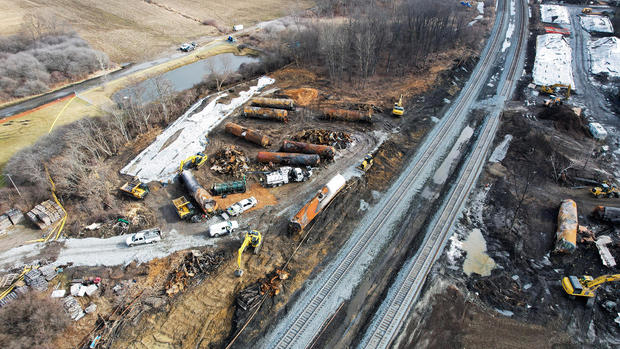Norfolk Southern required to attend public meeting with East Palestine residents nearly 4 weeks after toxic train disaster
(CNN) - Norfolk Southern is expected to attend a public meeting with East Palestine, Ohio, residents Thursday at the request and order of the U.S. Environmental Protection Agency, EPA regional administrator Debra Shore said in a Wednesday news conference.
The meeting comes nearly a month since the February 3 toxic train derailment and subsequent release of the dangerous chemical vinyl chloride. CNN reached out to Norfolk Southern -- the train operator -- about the meeting but has not received a response.
In the weeks since the fiery disaster, residents of the village have reported health ailments including rashes, bloody noses and headaches and have repeatedly voiced concerns about what the long-term impacts on their health and town could be. Last month, before the EPA order, Norfolk Southern had backed out of a town hall with local officials, citing threats against its employees.
And in a Wednesday letter, railroad unions criticized Norfolk Southern for also putting workers' health at risk after the derailment and not providing personal protective equipment.
Many employees "reported that they continue to experience migraines and nausea, days after the derailment, and they all suspect that they were willingly exposed to these chemicals at the direction of" Norfolk Southern, read the letter. It was sent to US Transportation Secretary Pete Buttigieg and Ohio Gov. Mike DeWine on behalf of the unions.
Buttigieg and Amit Bose, the Federal Railroad Administration head, met with leaders from 12 unions the same day.
CNN reached out to the company for comment.
Norfolk Southern has been ordered by the EPA to fully clean up the wreck or face expensive consequences. The company has publicly promised to do so and has vowed to invest in East Palestine "for the long-term."
While its efforts to remove contaminated soil and liquid continue, Norfolk Southern has also now submitted a plan for the state and federal EPAs to review on how it will remove contaminated soil from the site of the wreck, Ohio EPA Director Anne Vogel said Wednesday.
That task is an "exponentially larger" assignment than the removal work already being done, Vogel added. It will require that the train tracks are taken up before the soil underneath can be removed, Ohio officials have said.
A glimmer of hope for aquatic life
DeWine was at the site of the wreck and the cleanup operations for the first time Wednesday.
"The whole goal here is to make this community safe," the governor, who was joined by his wife, said. "It can't happen overnight, you can't get all this stuff out of here overnight."
It was his fourth time visiting East Palestine since the derailment, DeWine said.
Donning a safety vest and a hard hat, the governor also toured two bodies of water that were contaminated in the aftermath of the derailment -- Sulphur Run and Leslie Run -- with EPA officials.
Offering a glimmer of hopeful news, Vogel said wildlife is beginning to return to the contaminated streams around the village, after thousands of fish were killed.
"We've seen fish populations be restored, we've seen the aquatic life coming back four miles away, so it's getting closer," Vogel said. "It's a matter of time, but things will be restored."
Scientists say some chemical tests are unusually high
But anxiety continues to linger among residents about whether their health symptoms may be tied to the wreck -- and some scientists say tests in East Palestine show unusually high levels of some chemicals.
A data analysis from the EPA's measurements of pollutants released following the derailment suggests some levels of monitored chemicals are higher than normally would be found in the area, according to scientists from Texas A&M and Carnegie Mellon universities.
If the levels of some chemicals remain high, it could be a problem for residents' health in the long term, the scientists say.
The EPA and local government officials have repeatedly said their tests show the air quality in the area is safe and the chemicals should dissipate.
Air monitoring data shows levels of monitored chemicals "are below levels of concern for adverse health impacts from short-term exposures," an EPA spokesperson told CNN on Monday, adding the risks referenced by the analysis "assume a lifetime of exposure, which is constant exposure over approximately 70 years.
"EPA does not anticipate levels of these chemicals will stay high for anywhere near that."
The EPA is deploying a mobile laboratory to conduct "real time" air monitoring and sampling in the village, Shore announced Tuesday. The mobile lab will allow for air samples to be analyzed on site and deliver results quickly, instead of waiting on an off-site lab.
The agency is also exploring different kinds of soil sampling as residents express concerns about possible dioxins -- a kind of environmental pollutant -- in the soil, Shore added.
A fruity chemical smell some residents have noticed lingering in the village is caused by residual butyl acrylate, Vogel, with the Ohio EPA, told CNN Wednesday evening.
Butyl acrylate, which is among the materials the train was carrying, is used to make plastics and paint. It's possible to inhale it, ingest it or absorb it through the skin. It irritates the eyes, skin and lungs and may cause shortness of breath, according to the National Institute for Occupational Safety and Health. Repeated exposure can lead to lung damage.
Vogel said the levels being detected in water sampling are much lower than the federal hazard level for the compound in drinking water and well below levels that would cause immediate health effects, but added she did not know whether there could be long-term health effects. A health study currently underway may be able to help shed light on that, she said.
'Cleanup is just getting started'
EPA Administrator Michael Regan told CNN Tuesday he remains confident in the EPA's testing.
"Let me be clear -- EPA is testing for all toxic chemicals," Regan said. "We have a complete inventory of everything that was on that train, and everything we're monitoring for and testing for, we understand the levels of potential adverse health impacts from those toxics or any byproducts."
As things stand:
• The air in 578 homes has been tested, and the EPA reported detecting no contaminants associated with the derailment;
• Test results from 19 private wells found no evidence of contaminants linked to the train derailment;
• EPA tests of public drinking water "confirm that there is no indication of risk to East Palestine public water system customers," the agency said.
Norfolk Southern is expected to provide the EPA with an analysis of how much contamination there is and steps the company is taking to clean it up, Regan said.
"The cleanup is just getting started," he said. "We gave the company an order to clean this mess up -- they have a few more days to present a work plan to us."
Although testing has shown East Palestine's municipal water supply is safe for drinking, Regan advised children and adults not to play in the town's creeks and streams.
Alert system to give 'heads up' about waste
Meanwhile, shipments of contaminated waste from the site to various EPA-approved locations have resumed.
The EPA is coming up with measures to give authorities a "heads up" about incoming waste shipments and keep Norfolk Southern accountable for the material it is moving, Regan said.
Indiana Gov. Eric Holcomb on Tuesday became the latest out-of-state official to say he was stunned to learn hazardous waste from the Ohio site was headed to his state.
Last week, the EPA ordered Norfolk Southern to temporarily stop the shipments so it could review the company's disposal plans. Officials in Texas and Michigan had complained they didn't get any warning waste from the toxic crash site would be shipped to their states.
The federal agency later said it approved two sites in Ohio to handle the safe disposal of waste and shipments to those locations began Monday. Two more sites -- one in Indiana and another in Ohio -- were set to receive contaminated waste starting Tuesday, Shore said earlier this week.




